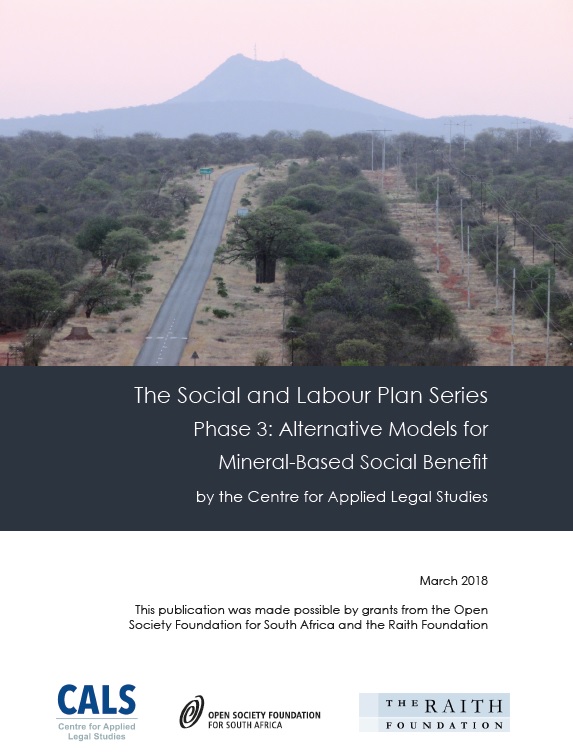The Social and Labour Plan Series
Phase 3: Alternative Models for Mineral-Based Social Benefit

15 March 2018
Centre for Applied Legal Studies
English
Guide/ Handbook
Municipal Capability & Partnership Programme
Africa
The mining sector in South Africa faced a period of turmoil characterised by low commodity prices, policy and legislative uncertainty, political power struggles and mine-community discontent that drove general disillusionment with the sector. As these events unfolded the State’s response was being driven by a transformative agenda, yet communities were still without tangible and meaningful benefits.
Community and worker benefits as encapsulated in the Mining Charter and the Social and Labour Plan (SLP) System contain direct obligations to contribute meaningfully to the economic and social development of mine-affected communities.The SLP system, in particular, is meant to channel benefits into mine-affected communities to ensure that impacted areas are not left destitute and impoverished by mining. The Centre for Applied Legal Studies (CALS) has, for this reason, conducted research into the SLP system. Its previous two reports in the series uncovered flaws both in how the system is designed and in how it is implemented in practice. The findings were sufficient to justify a conclusion that the SLP system is fundamentally flawed.
The purpose of this report is to set out possible alternative models for a more transparent and democratic system that would position communities as central stakeholders. The report will also suggest some amendments to the present system that can be pursued pending any thorough-going revision of the mining regulatory regime. The report begins by introducing the aims of the project and delves into the context of the complex area of extractive-based social benefit. The chapter further explores the questions that we seek to address and the legislative basis for SLPs. The report then moves to briefly summarise the findings of the previous two research reports, on design and implementation respectively. The body of the report commences with the proposed immediate and short-term recommendations for an improved SLP system. The immediate recommendations mostly consist of provisions that are required for the SLP system to work, but which are not included in the present legislative instruments. The full list of such provisions will be provided in the body of the report, but some of these include access to information, gender equality and specified requirements for community participation. The penultimate chapter contains model legislative clauses which are designed to be inserted into the existing law. The final chapter looks beyond the current SLP system to propose fundamental changes that are vital to ensuring a democratic system rooted in principles of community-centred development.
This resource is part of the Mining Towns Collection kindly sponsored by the Municipal Capability and Partnership Programme. Abstract based on source.


Comments